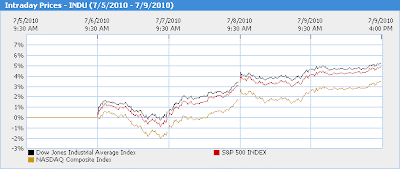More corporate earnings were released this week and were reasonably decent, spurring a rise in the market. For the week, the Dow rose 3.2%, the S&P gained 3.5%, and the Nasdaq topped the both at 4.2%. There was little change in gold, while oil gained more than 3%.
As you can see in the chart above, it was a fairly volatile week on Wall Street. The latest batch of earnings beat expectations and revenues were mostly good, providing the backdrop that sent the markets higher. These companies really don’t look that bad, particularly ones with overseas operations. It was a pleasant surprise to us and encouraging sign for the future.
The market dropped sharply on Wednesday, however, when the Fed chairman Ben Bernanke called the outlook of the
More disappointing economic data came in this week, as well. Housing remains incredibly weak and we believe it has further to go. Leading economic indicators fell slightly, and there was an increase in weekly unemployment.
It is quite a contrast between these poor economic reports and solid corporate earnings. Companies have become very streamlined while still meeting demand and we don’t see them cutting any more at current demand levels. We worry, though, that the weak economy will affect that demand and force more cost cuts. On the other hand, if economic conditions improve, it will certainly mark a bottom in the market and stock prices will rise.
Next Week
Earnings season rolls on next week with a new batch of releases. Like before, we won’t be watching just the earnings, but their revenues, as well.
Several economic reports will also be released, so it will be another busy week. The most important data comes in on Friday with the release of the second quarter GDP. It is anticipated to come in slightly below last quarter and any surprises will impact the market.
Where are we investing now?
With the economic picture continuing to be weak, we remain cautious despite encouraging reports from businesses. Like we said last week, companies with a large overseas presence (especially
Our big-picture outlook still remains the same, as we are optimistic through the end of the year. Low interest rates and the remaining stimulus will push the markets higher. The higher interest rates down the road, higher taxes, increasing government involvement in the private sector, and a still-high unemployment rate have us worried for the longer term.
In equities, we are focused on higher-quality and multi-national stocks, but some smaller stocks look promising, as well. We continue to avoid banking and insurance sector stocks. TIPs are important as we expect inflation to increase in the future, while



